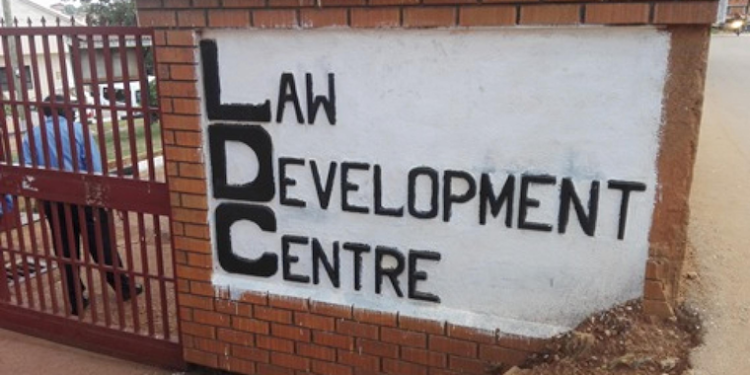By THE OBSERVER UG
In a recent development, the Law Development Center (LDC) in Uganda has taken a significant step by urging the Law Council to initiate an investigation into the authenticity of degrees issued by specific universities.
This call to action comes in response to mounting concerns regarding a growing trend within the institution—a surge in the enrollment of students boasting impressive academic credentials who subsequently encounter difficulties in successfully completing the Bar course offered at LDC.
The matter was brought to the forefront by Annet Karungi, the head of the Bar course at LDC, during a session with the Legal and Parliamentary Affairs Committee. Karungi underscored the necessity for a comprehensive evaluation of the academic qualifications originating from specific universities.
She shed light on a disconcerting pattern that has emerged—a pattern wherein students, despite their notable academic achievements, grapple with various challenges in passing core subjects during their training at LDC. Karungi told the committee session that, “The pattern in the recent academic years is really not necessarily the best, and many of them actually end up clogging the system by repeating various subjects, something that we have shared with the Law Council.”
The Bar course specifically prepares students to fulfill their roles as legal practitioners while facilitating the drafting and interpretation of legal documents and materials, helping students appreciate their practical application.
The duration of LDC courses is as follows:
• Bar course – one academic year.
• Diploma courses – one academic year.
• Certificate courses – one (day program), three months (evening & weekend).
Applicants obtain application forms from the office of the Academic Registrar upon payment of an application fee of two hundred thousand shillings (200,000/-) to the Law Development Centre Centenary Bank Account number 3100050985. Furthermore, the Center has a single intake for the academic year 2023/2024 at the three campuses in Kampala, Lira and Mbarara.
The Law Development Center (LDC) faced a substantial challenge when it received an overwhelming number of over 3,000 applicants for its programs, causing limitations due to constrained facilities. Karungi clarified that the institution’s decision to exclude certain applicants was influenced by the disproportionately high number of students holding first-class and second-class upper degrees from specific universities.
Explaining the situation, Karungi stated, “We didn’t refuse to admit any student, but the high number of students with top grades from some universities pushed the center to admit only 60 per cent from each university.”
This situation has raised concerns about the integrity of academic qualifications and the admission process. In response to these challenges, LDC is now calling upon the Law Council, the regulatory body, to investigate the authenticity of degrees granted by the concerned universities.
The aim is to unveil any irregularities in the academic qualifications of applicants and ensure the transparency and credibility of the admissions process. This revelation coincided with LDC’s presentation of its proposed budget for the upcoming financial year (2024/2025) before the parliamentary committee.
During this presentation, LDC emphasized the critical importance of a collaborative effort to uphold the quality and standards of legal education within the country. The potential impact of the proposed investigation could have far-reaching implications, affecting both the universities under scrutiny and the broader legal education system in Uganda.
TEACHING PRACTICES
Interviewed about the disconcerting trend of students entering LDC with impressive academic credentials only to face difficulties and failures in their bar course, Frank Obonyo, the spokesperson for LDC, acknowledged the institution’s challenges with student performance.
He emphasized the necessity for a shift in teaching practices, moving away from what he termed a “spoon-feeding” approach towards a more student-centered one. Obonyo attributed part of the strain on facilities and the resultant challenges in the education system to the high influx of students, a situation exacerbated by the removal of the LDC Bar pre-entry exam.
He proposed the reinstatement of the exam to better assess, and filter students based on their abilities, regardless of their academic backgrounds. This change could potentially address some of the issues faced by students and the institution alike.
Obonyo stated, “Poor academic performance is an issue that our nation is currently facing,” and underscored the Law Development Centre’s commitment to enhancing lawyers’ skills. He identified a critical problem: students who achieve high grades through what he calls “spoon-feeding” struggle at the LDC, where the educational approach is more student-driven.
“At the LDC, students are responsible for 70 per cent of their performance through discussions and individual assessments, while lecturers contribute 30 per cent,” Obonyo emphasized, indicating a transition from the spoon-feeding method, to which some students are accustomed, towards a more self-directed learning model.
In response to LDC’s complaint about high-achieving students struggling at the bar, Samuel Davis Hiire, an education consultant, highlighted a significant disconnect between what schools impart and real-world expectations. He expressed concern that the education system prioritizes scores over essential learning tools and practical skills.
Hiire advocated for a shift towards practice-based or competency-based education, emphasizing the need for alignment between government initiatives and teacher readiness. He warned against implementing new educational approaches without first addressing the challenges in teacher preparedness.
He further emphasized, “This highlights that Uganda’s education system is overly focused on scores, demonstrating a significant neglect in providing essential learning tools and preparing students for the practical realities of the real world.”
“The discrepancy between the number of children achieving top grades in primary school and the high dropout rates before secondary education is also telling. This gap becomes even more apparent during the transition to university and the workforce, showcasing a stark disconnect. Education has, regrettably, become mere rhetoric, where teachers predominantly engage in spoon-feeding and providing answers. As a result, when these students enter institutions like the Law Development Centre, where the learning approach is more student-driven, they often face challenges that lead to academic difficulties,” Hiire remarked.
He further posed critical questions, asking, “Do students entering institutions like the Law Development Centre genuinely earn first-class and second-class upper grades, or are they obtained through other means? This raises concerns about why students with initially high grades struggle at LDC or fail to meet expectations in other fields.”
This unfolding situation raises critical questions about the alignment of academic qualifications with real-world practicality and highlights the need for a comprehensive assessment of the qualifications issued by specific universities, as called for by LDC, to ensure the competency of students pursuing legal careers in Uganda.







Discussion about this post